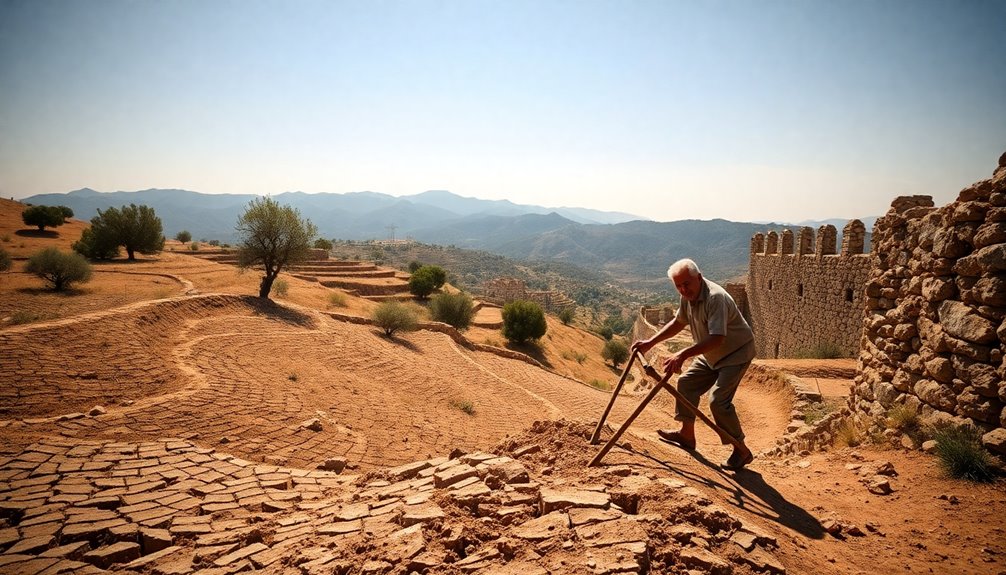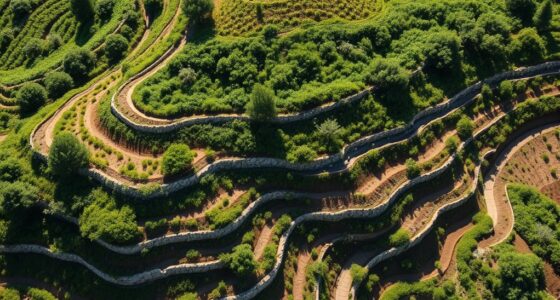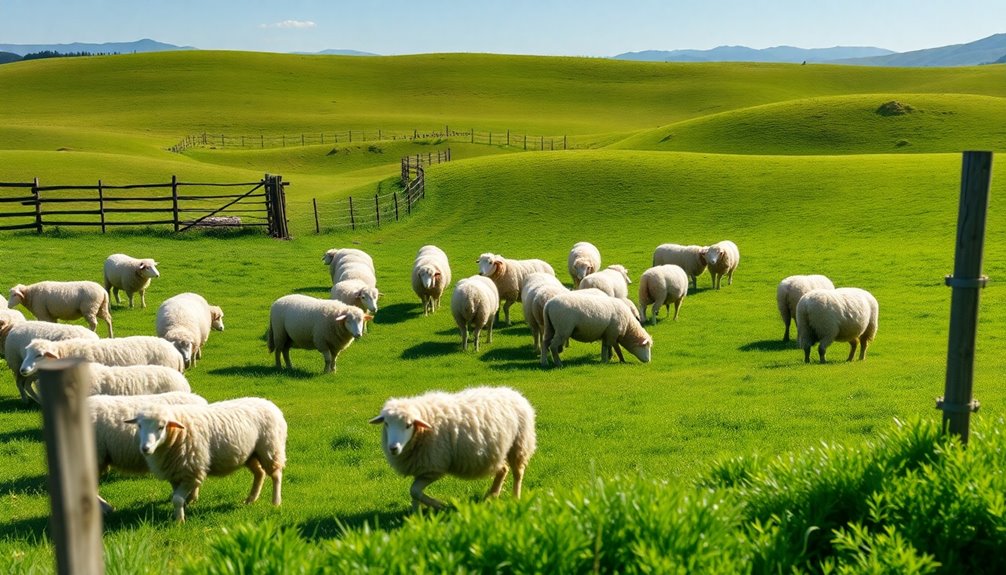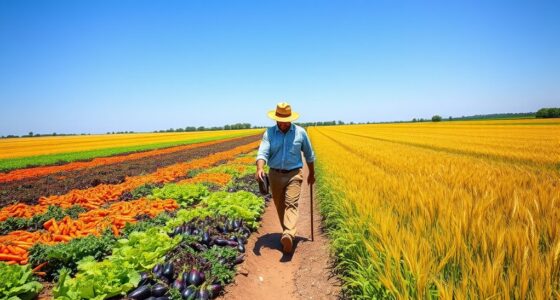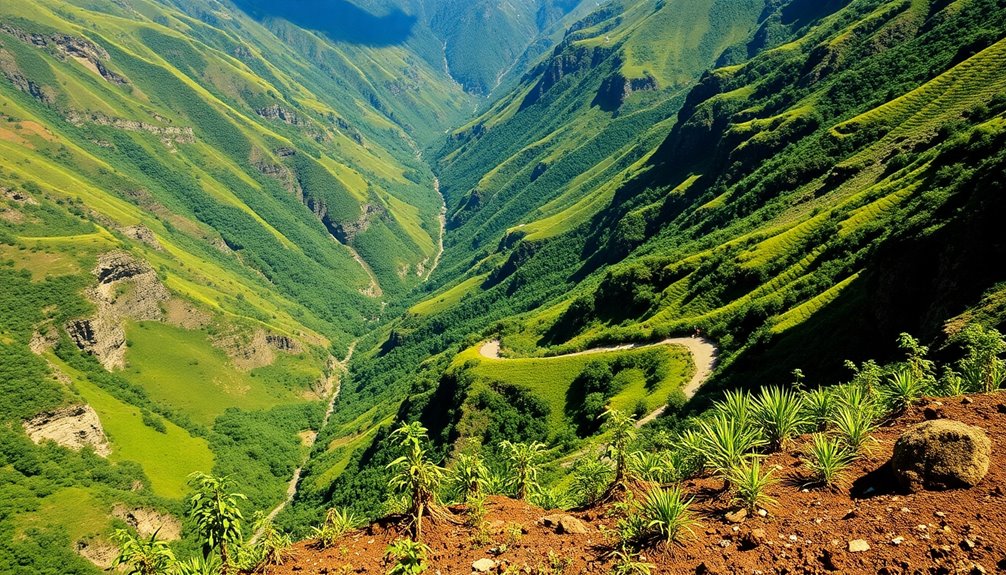Farming in Greece poses significant challenges due to its rugged terrain and limited arable land. With only 20% of land suitable for cultivation, you'll find steep, rocky areas complicating traditional farming. The Mediterranean climate brings long, hot summers and unpredictable rain, adding to water shortages. Economic struggles, like heavy taxation, hinder small farmers' productivity, while land ownership inequalities create additional strain. Many farmers relied on subsistence methods, facing further limitations from basic tools and irrigation issues. If you're curious about how these factors shaped agricultural practices, there's much more to explore.
Key Takeaways
- Greece's rugged terrain and mountainous regions limited arable land, complicating traditional farming practices and large-scale agriculture.
- The Mediterranean climate's long, hot summers and unpredictable rainfall created significant water shortages, affecting crop growth.
- Farmers faced technological limitations with basic wooden and iron tools, relying heavily on manual labor and subsistence farming.
- Economic factors like heavy taxation and market regulations stifled small farmers, leading to reliance on external resources for survival.
- Wealth inequality in land ownership resulted in fragmented farms, complicating productivity and creating tensions between wealthy landowners and small farmers.
Geography's Impact on Farming
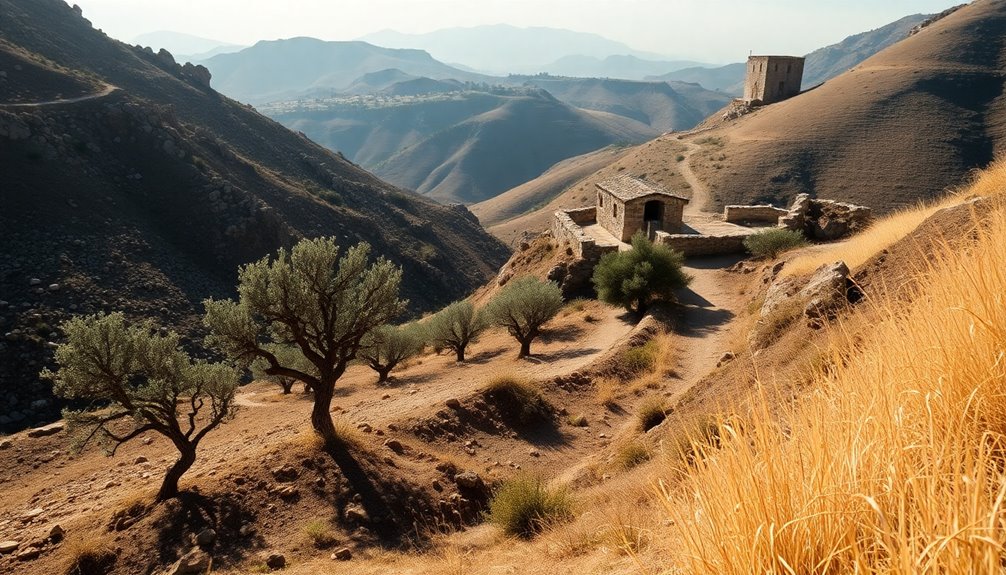
Greece's rugged geography profoundly shapes its farming landscape. With only about 20% of its total surface as arable land, large-scale farming isn't practical.
The mountainous terrain creates isolated valleys, leading to the rise of independent city-states, which restricts extensive agricultural networks. You'll notice that steep and rocky areas complicate traditional farming practices, making it tough to transport crops and access markets.
Adding to these challenges, the Mediterranean climate brings long, hot, dry summers and unpredictable rainfall, creating significant irrigation issues.
Poor soil quality and diverse local conditions result in inconsistent crop fertility, often leading to crop failures and agricultural instability.
Farming Techniques and Limitations
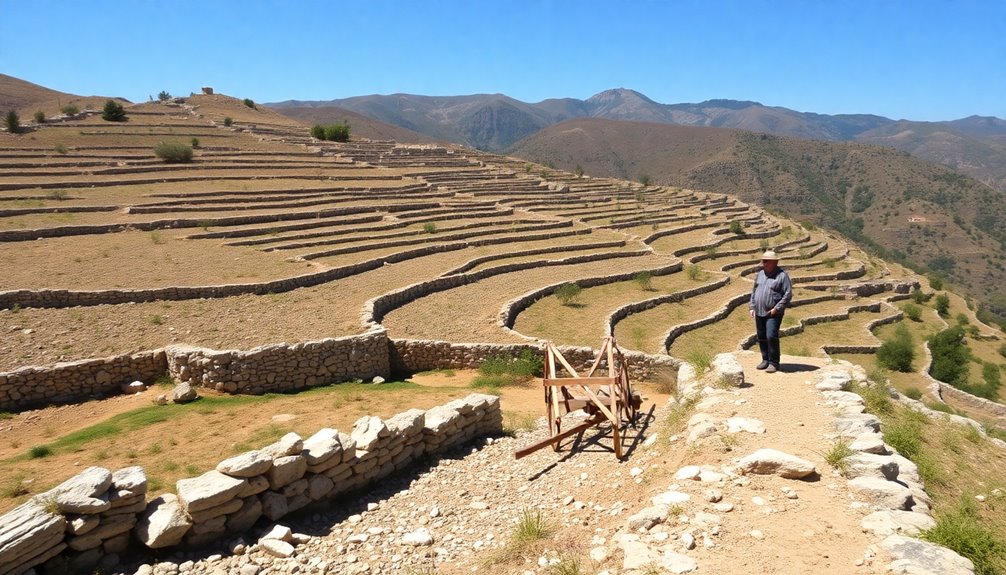
Farming techniques in ancient Greece were shaped by the challenging landscape and limited resources available to farmers. With only about 20% of the land suitable for cultivation, agriculture in the Greek city-states often relied on subsistence farming, which restricted output and made you vulnerable to crop failures.
You'd notice that terrace farming became essential for maximizing arable land on steep hillsides, allowing for greater cultivation despite the difficult geography. However, the basic agricultural tools, primarily wooden and iron ploughs, sickles, and hand tools, hindered productivity.
Additionally, limited freshwater sources complicated irrigation efforts, forcing farmers to create small channels and cisterns to manage water supply. These farming techniques reflected the significant limitations faced by those working to cultivate the land.
Economic Influences on Agriculture
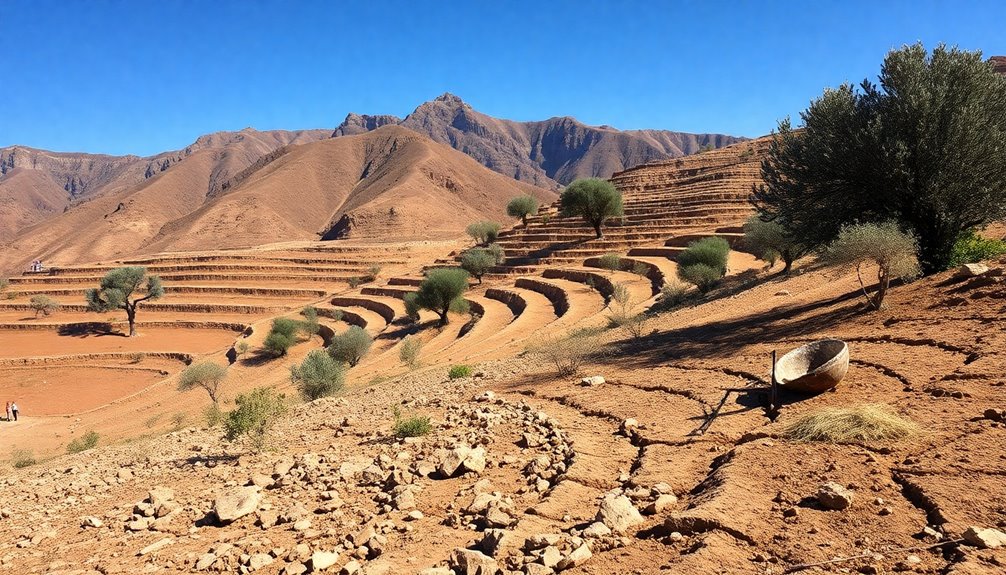
When you look at Greece's agricultural history, it's clear that trade has played a vital role in shaping its economy.
With limited agricultural output, the focus on exports like olive oil and wine became essential for survival.
However, heavy taxation and market regulation have often stifled the potential of small farmers, complicating their ability to thrive in a competitive landscape.
Trade Reliance and Exports
In ancient times, many communities found themselves reliant on trade due to the limitations of their agricultural output. With only 20% of the land arable, Greek agriculture struggled, leading to a strong dependence on external resources.
| Key Exports | Importance | Trade Hub |
|---|---|---|
| Olive Oil | Essential for diet | Piraeus |
| Wine | Cultural significance | Piraeus |
| Grain | Basic sustenance | Piraeus |
| Crafts | Economic stability | Piraeus |
As olive oil and wine became primary exports, trade networks flourished, bolstering economic stability. The barter system allowed communities to exchange surplus products for necessities, making trade vital for survival amid economic instability and crop failures.
Taxation and Market Regulation
Taxation and market regulation greatly influenced Greek agriculture, creating a challenging landscape for farmers. You'd find that city-states imposed heavy taxes on the movement of goods, driving up costs for agricultural trade. This burden made it tough for local farmers to compete against wealthier landowners and imported products.
Higher taxes on both imports and exports complicated matters further, limiting your market access. Market officials, like agoranomoi and sitophylakes, enforced strict standards, adding pressure to guarantee quality and pricing compliance.
Additionally, the presence of special grain buyers in Athens controlled the wheat trade, restricting your selling options and complicating your relationship with the market. Ultimately, these factors made farming in Greece a formidable endeavor.
Social Structure and Land Ownership
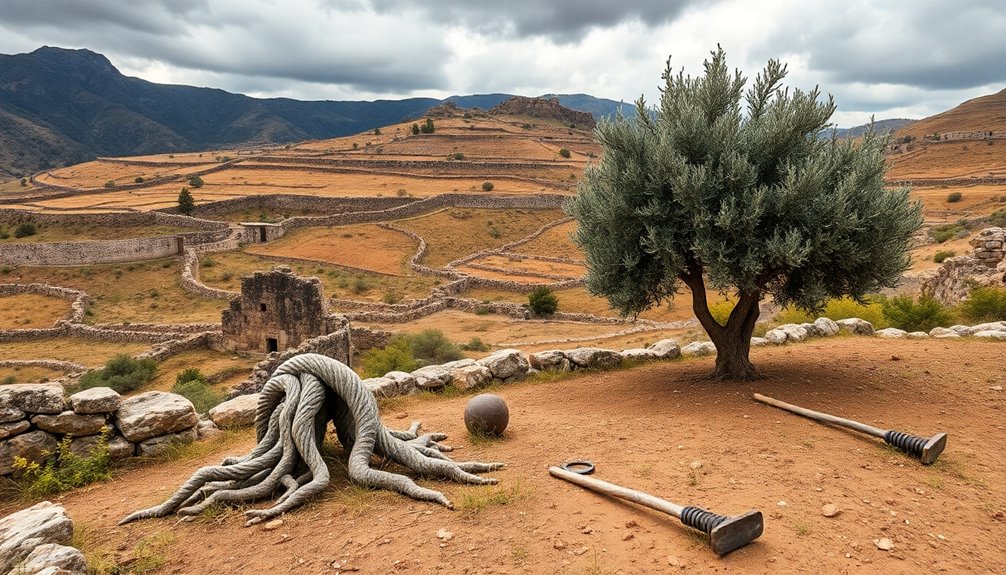
Greece's social structure and land ownership reveal stark inequalities that shaped its agricultural landscape. The wealthiest citizens, known as Eupatrides, dominated land ownership, controlling extensive agricultural property while small farmers struggled under heavy taxation.
Many peasants worked on large landowners' estates or rented small plots, highlighting the stark divide between affluent aristocrats and impoverished farmers. In Athens, average farms ranged from 5 to 20 hectares, while Sparta attempted to address disparities through land redistribution.
However, inheritance laws fostered fragmented land ownership, complicating agricultural productivity. Tensions between the wealthy and small farmers led to significant reforms, like Solon's efforts in 594 BCE, but the challenges of an unequal social structure continued to impede farming success in Greece.
Historical Context of Agricultural Practices
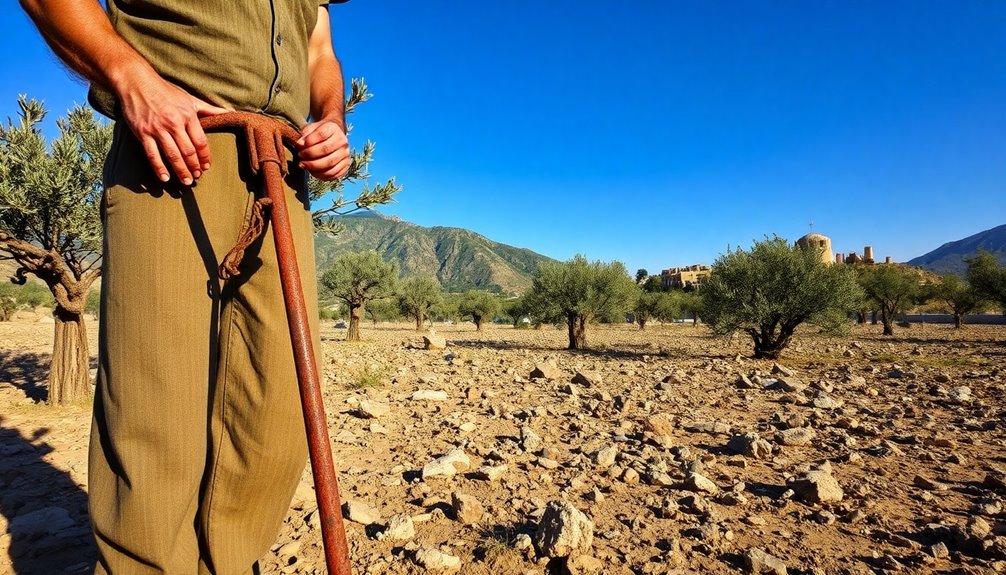
Agricultural practices in ancient times were shaped by the unique challenges presented by the Greek landscape. With only about 20% of the land suitable for farming, ancient Greeks faced significant obstacles, leading to isolated city-states.
The Bronze Age collapse further exacerbated issues, causing agricultural productivity to decline and fostering a reliance on trade instead of farming for sustenance. Surviving texts from figures like Theophrastus and Hesiod reveal that agriculture in Ancient Greece was primarily subsistence-based, with limited techniques.
Socio-economic disparities arose as land ownership concentrated among aristocrats, restricting small farmers' access to resources. Additionally, irregular rainfall and inconsistent soil quality often resulted in crop failures, making farming difficult in Ancient Greece and necessitating the importation of essential foodstuffs to stave off famine.
Major Crops and Livestock
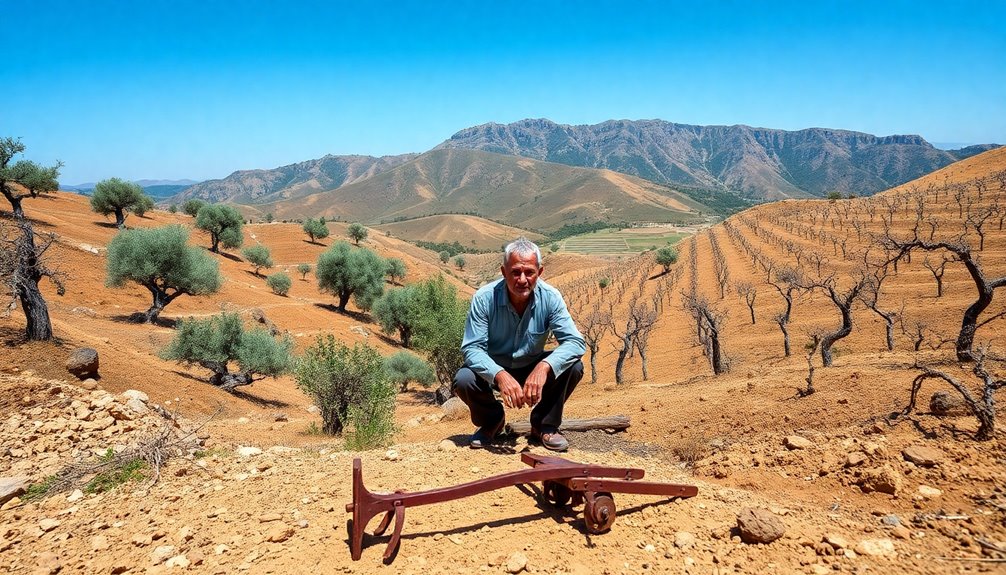
The agricultural landscape of ancient Greece was defined by a few major crops and livestock that played a fundamental role in daily life and trade.
You'd find staple crops like wheat, barley, and pulses thriving in the rugged terrain, while olives took center stage for their essential production of olive oil. Grapes were also significant, requiring careful cultivation and contributing to the local economy.
Regarding livestock, sheep and goats were indispensable, providing meat, milk, and wool, while oxen served primarily as work animals.
Vegetable gardens featured crops like cabbage and onions, complemented by herb gardens filled with sage and oregano.
Together, these elements created a diverse agricultural system, though challenges remained in maximizing their potential.
Trade and Agricultural Exchange

While traversing the rugged terrain of ancient Greece, city-states quickly learned that trade was fundamental for survival.
With limited agricultural output, they relied heavily on the exchange of surplus products like olive oil and wine to sustain their economies. Piraeus emerged as a significant trading hub for these goods, bolstering Athens' economic stability.
The barter system facilitated agricultural exchange, allowing locals to swap excess for necessary resources. However, the importation of grain, particularly from Egypt and the Black Sea, was essential to stave off starvation.
To guarantee fair pricing and quality, Athens implemented regulations, including appointing special grain buyers (sitones) to manage the wheat trade.
This structured trade not only supported local needs but also reflected the importance of agricultural exchange in maintaining food security.
Innovations and Adaptations in Farming

With trade forming the backbone of ancient Greek economies, farmers had to innovate and adapt to maximize their limited resources. They developed terrace farming techniques to cultivate crops on steep hillsides, which allowed them to manage water runoff effectively while making the most of arable land.
To combat water scarcity during long, hot summers, innovations in irrigation systems, like small channels and cisterns, became essential for sustaining crop yields. Greek farmers embraced crop rotation and fallow fields to regenerate soil quality and improve long-term productivity.
Additionally, they focused on crop diversification, cultivating resilient products like olives and grapes that thrived in the Mediterranean climate and greatly contributed to trade, despite their limited agricultural technology.
Frequently Asked Questions
Why Was Farming so Difficult in Ancient Greece?
Farming in ancient Greece was tough for you due to the mountainous terrain limiting arable land, making it hard to cultivate large areas.
You faced a challenging Mediterranean climate with hot summers and short winters, which restricted your growing season.
Irrigation was essential but difficult.
Additionally, heavy taxation and land concentrated among the wealthy made it harder for small farmers like you to thrive, especially when crop failures jeopardized your community's survival.
Why Is It Difficult to Grow Crops in Greece?
Growing crops in Greece can be a challenge; one minute you're basking in the sun, and the next, you're grappling with rocky terrain.
With only about 20% of the land suitable for farming, you've got limited options. The Mediterranean climate offers long, hot summers that dry out the soil, making irrigation tough.
Plus, variable soil quality can lead to unpredictable yields, leaving you struggling to cultivate enough for your needs.
What Are the Problems With Agriculture in Greece?
You'll find several problems with agriculture in Greece. The rugged terrain limits arable land, making it hard to grow crops efficiently.
Water scarcity during hot summers further complicates matters, often leading to poor yields. Additionally, varying soil quality affects productivity, while reliance on subsistence farming restricts surplus crop production.
Finally, concentration of land among wealthy elites marginalizes small farmers, creating economic disparities and limiting access to essential resources for successful farming.
What Two Reasons Was the Land of Greece Unsuitable for Farming?
Imagine standing on rocky hills, looking at the sparse patches of soil below. You realize that Greece's land is largely unsuitable for farming for two key reasons.
First, the rugged terrain limits arable land, leaving you with only 20% suitable for crops.
Second, the irregular rainfall creates water scarcity, leaving your plants thirsty in the scorching summers.
These challenges turn farming into a constant struggle for survival, testing your resilience at every turn.
Conclusion
So, farming in Greece was a walk in the park—if that park was made of rocky hills and droughts! With innovative techniques like praying for rain and hoping the soil would magically improve, it's a wonder they grew anything at all. Yet, amidst the chaos of land disputes and economic woes, those clever Greeks managed to cultivate some crops and trade like pros. Who knew turning hardship into harvest could be such an ancient art form?

